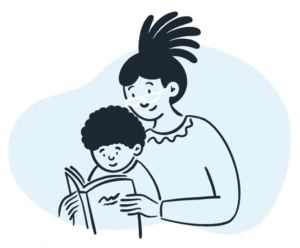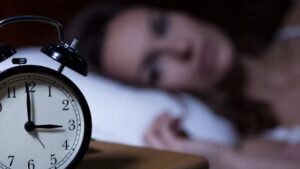Women and Sleep Guide
Disclosure: By clicking on the product links in this article, Mattress Nerd may receive a commission fee at no cost to you, the reader. Read full disclosure statement.
Too many Americans are not getting enough sleep, putting them at greater risk for a wide range of medical issues including hypertension, depression, obesity, and accidents. The problem has become so rampant that the Centers for Disease Control and Prevention (CDC) has deemed sleep deprivation a “public health epidemic.” But when it comes to sleep, researchers have found that women fare worse than men and the problem has a lot to do with body chemistry.
In fact, the National Institutes of Health Office on Women’s Health found that more than one in four women in the United States experiences insomnia — the No. 1 sleep disorder —compared to just one in five men.
Sleep problems can be caused by any number of issues including sleep disorders, health problems, medication, and stress. Coincidentally, some problems that cause insomnia are more common in women than men, such as depression and anxiety and fibromyalgia.
But hormones — the body’s chemical messengers — can also play a role in disrupting a woman’s sleep as they fluctuate throughout her life. According to research published in the journal Current Opinion in Pulmonary Medicine, gender differences in sleep become apparent after the onset of puberty. “Menstruation cycles, pregnancy, and menopause can alter sleep architecture,” the researchers summarized. “Gender-related differences in sleep disorders such as obstructive sleep apnea, insomnia, and restless legs syndrome, including differences in prevalence, pathophysiology, clinical presentation, and response to therapy.”
Why sleep is important for women
Hormones play an important role in our sleep. Melatonin, the body’s natural sleep hormone, is released at night to help us feel sleepy for bedtime. The pituitary gland also releases growth hormone, which helps your body grow and repair cells, tissues, and muscles. This process is regulated by our circadian rhythm.
When we don’t get enough sleep, “it can disrupt the body’s natural circadian rhythms, which regulate the release of hormones,” says Steve Hruby, a chiropractor and founder of Kaizen Progressive Wellness, a chiropractic care facility in Scottsdale, Arizona. This can be especially harmful for women, he adds. “It can increase levels of the stress hormone cortisol, which can interfere with ovulation and menstrual cycles. In addition, lack of sleep can lead to weight gain, which can further disrupt hormone levels” contributing to diabetes and heart disease.
A woman’s hormones fluctuate greatly during her life, and so do her sleep needs. The CDC recommends that adults between the ages of 18 and 60 get at least 7 hours of sleep each night.
“During puberty, girls need about 8 to 10 hours of sleep,” Hruby says, especially deep sleep in order to jump start puberty, the American Academy of Sleep Medicine reports. “This sleep need increases somewhat during menstruation when women need an average of 9 hours per night,” Hruby says. “Pregnant women need about 10 hours of sleep per night, and new mothers should aim for at least 14 hours of sleep per night in the first few weeks postpartum.
“In general, women need more sleep than men do,” he adds.
Life stages and sleep
A woman experiences hormonal imbalances throughout her life which can ultimately interfere with sleep. “These hormonal changes are reflected as cramps, bloating, mood swings, hot flashes, and so on,” says Dr. Veena Madhankumar of iCliniq. “All these can lead to insomnia which, in turn, can lead to anxiety and depression and also cause several other health problems.”
Hormonal imbalances during different stages in a woman’s life can affect her sleep:
Puberty – Hormone changes can lead to severe mood swings, anxiety, depression, night awakenings, daytime sleepiness, etc., which can lead to insomnia during this time.
Periods – Severe cramps, bloating, and mood swings associated with premenstrual syndrome (PMS) and premenstrual dysphoric disorder (PMDD) can affect sleep leading to insomnia, frequent nighttime awakenings, and non-restoration of sleep, the Journal of Sleep Medicine and Disorders.
Pregnancy – Increased insomnia is reported in pregnancy mainly due to nocturia (getting up to urinate at night), hypersomnia, snoring, and restless leg syndrome (RLS). In fact, about 10 to 34 percent of pregnant women experience RLS during pregnancy. In most cases, symptoms of RLS resolve shortly after delivery though in some cases, the condition persists into the postpartum period. One theory is that RLS in pregnancy may be due to folic acid or iron deficiency.
Postpartum – During this period mother’s sleep is affected by the infant’s sleep pattern. Newborns tend to wake every few hours, fragmenting mother’s sleep. As the baby begins to sleep longer during the night, sleep problems experienced during pregnancy typically improve. However, studies have shown that postpartum women prone to depression are at an increased risk of becoming depressed in the later postpartum phase if sleep problems worsen or show only minimal improvement over time.
Perimenopause & Menopause – Fluctuations in estrogen and progesterone levels may lead to hot flushes which can lead to nighttime awakenings. The loss of reproductive hormones can also contribute to sleep disorders such as insomnia and sleep apnea. In fact, postmenopausal women are two to three times more likely to suffer from sleep apnea compared to premenopausal women, according to Johns Hopkins Medicine. Women with undiagnosed sleep problems may suffer from symptoms related to their sleep disorder such as daytime fatigue but blame it on menopause instead.
Tips for women to improve sleep
Treat your symptoms: The discomfort of menstrual cramps can seriously disrupt sleep. Consider taking over-the-counter pain relievers such as ibuprofen and using a heating pad on your abdomen to dull the pain.
Relaxation techniques: Physical discomfort and mental anxiety associated with hormonal imbalances can cause tension and make it impossible to settle down to sleep. Try relaxation exercises before bedtime. Sit quietly and focus on your breathing, or concentrate on tensing and then relaxing different muscle groups.
Enjoy the sunshine: Natural daylight strengthens the circadian rhythm and helps combat daytime sleepiness, further strengthening the release of melatonin at night and increasing your desire at bedtime.
Reduce blue light exposure before bed. Blue light is emitted by electronic devices such as TVs, smartphones, and tablets. This particular wavelength of light also stimulates the brain and interferes with the body’s release of melatonin, the body’s natural sleep hormone. Unplug from electronics at least 30 minutes before bedtime to allow your mind to unplug, as well.
Set a regular sleep/wake schedule: Setting a consistent bedtime and wakeup time also strengthens the circadian rhythm and helps you fall asleep at night and wake up rested in the morning.
Create a relaxing bedtime routine: Creating a nighttime routine signals to your body and brain that it’s time to sleep. Nighttime routines should begin at least 30 minutes to 90 minutes before bedtime and include personal hygiene practices such as brushing your teeth, washing your face, taking a bath, and reading a book.
Try a natural sleep aid: Natural sleep aids include supplements such as melatonin, valerian root, and magnesium. Lavender and chamomile soaps, essential oils, and teas are also an option for coaxing sleep at night.
Cut back on stimulants too late in the day: Caffeine in that afternoon cup of coffee or can of soda can stay in your system for four hours or more and interfere with falling asleep if taken too late in the day. Nicotine is also a stimulant, so avoid cigarettes or vapes too close to bedtime as well.
Cut down on nightcaps: A hot toddy before bed can help you fall asleep. Alcohol is a depressant, after all. But one too many and it can wreak havoc on your sleep.
Create a sleep sanctuary: Your bedroom should be reserved for sleep and sex only. And it should be conducive to both. Be sure your mattress is comfortable and supportive, that your bed linens and pajamas are cool and cozy, and that your room is adequately dark at night. Also lower the thermostat a few degrees during the night to ensure a good night’s rest.
Talk to someone: Fluctuating hormones can cause moodiness and anxiety. Sometimes the best medicine is talking it out. Seek out a trusted friend or consider speaking to a licensed professional counselor. Dealing with the issues that upset you can help you cope which translates to better sleep.
Seek medical advice: If you are still struggling to feel rested in the mornings and are excessively sleepy later in the day, talk to your doctor to rule out any medical issues that may be contributing to your sleep problems. They may order a sleep study to rule out the possibility of a sleep disorder, such as sleep apnea, for which there are treatments.
Final Thoughts
Sleep is an epidemic among Americans, and thanks to hormonal imbalances throughout their lives, women are especially vulnerable. But that doesn’t mean you have to suffer in silence. Understanding the effect hormones have on your sleep can help you identify the best way to deal with the symptoms or problems affecting your sleep through all the seasons of your life.

